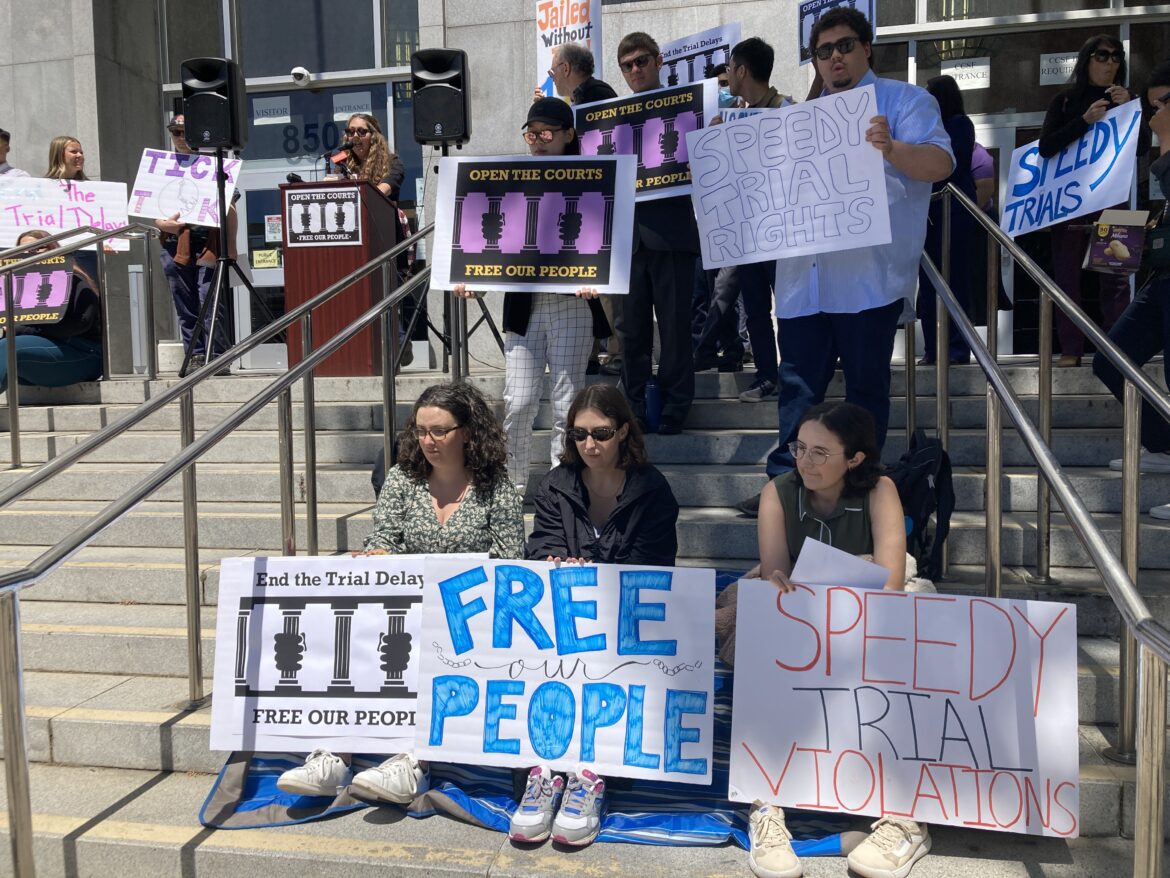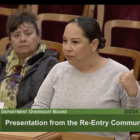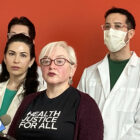Updated Wednesday, Aug. 9, 2023: A legal filing by the plaintiffs Monday to the California Supreme Court defended the idea that taxpayers have standing to challenge poor management of state resources. Details at the end of this article.
A lawsuit against San Francisco Superior Court over its routine failure to uphold defendants’ right to a speedy trial is in the hands of California’s Supreme Court.
San Francisco has more than 1,100 cases past statutory time limits, and 115 of those defendants are languishing in jail without a conviction.
At a rally on the steps of the Hall of Justice last week, concerned residents and staffers with the Public Defender’s Office gathered to denounce what they view as San Francisco Superior Court’s routine breach of criminal defendants’ constitutional rights.
San Francisco resident Christine Sipra said during the protest that when she saw media reports about defendants sitting in jail for years awaiting trial, she was compelled to join the San Francisco Public Defender’s Office rally.
“Who’s being affected? Our community members, our neighbors — and it does not escape me that any one of us can be affected by this,” Sipra said. “This could be our friends, our families. This could be something that might affect me in my life dramatically. People are losing their homes, their jobs, pets — all kinds of circumstances are being affected by people that are being held without the basic human right of a speedy trial.”
In September 2021, San Francisco Public Defender Mano Raju and four others — including two mothers of adult children whose speedy trial rights were violated — filed a taxpayers’ lawsuit to compel San Francisco Superior Court to address the backlog, which began when COVID-19 shelter-in-place orders suspended court proceedings in March 2020.
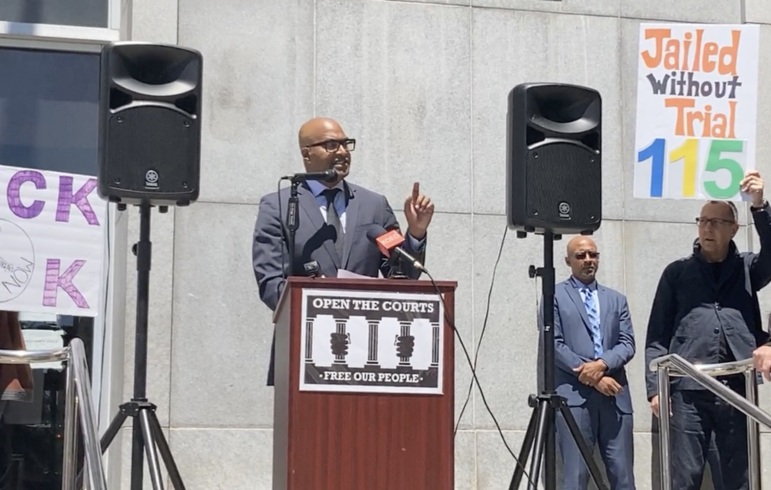
Sylvie Sturm / San Francisco Public Press
San Francisco Public Defender Mano Raju and four others have filed a lawsuit to compel San Francisco Superior Court to address its excessive trial backlog. He speaks about San Francisco’s excessive trial delays on the steps of the Hall of Justice at 850 Bryant St. on July 28.They demanded that the court abide by California statutes requiring that priority be given to criminal trials over civil cases, and to cases where the accused is incarcerated pre-trial. It also stipulated that the court follow procedural steps before extending criminal trials beyond time limits.
Raju’s lawsuit went to Contra Costa County Superior Court, and in December 2021, Judge Edward Weil ruled that his court did not have the authority to compel the San Francisco court to act. He said relief must be sought in the Court of Appeal instead.
Raju filed a notice of appeal with the California Court of Appeal in March 2022 and filed his opening brief in July that year. In January 2023, San Francisco Superior Court filed a response and oral arguments were heard in April. On June 8, the First District Court of Appeal reinstated the suit and ruled that Raju and his fellow petitioners can seek court orders to reserve more courtrooms for criminal trials.
This week, San Francisco Superior Court filed a petition for review from the California Supreme Court arguing that permitting lawsuits that challenge court administration would have “profound” adverse consequences.
“The final destination of the Court of Appeal’s ruling is chaos,” states the court’s petition. “If the presiding judge and the judge assigned to the taxpayer action gave conflicting orders about opening courtrooms, security, and staffing, nobody would know which orders to follow.”
The petition stated that the First District Court of Appeal was wrong when it claimed that the civil code authorizes taxpayers’ lawsuits against state officials.
“It does not,” states the court’s petition. “The statute authorizes actions against officers or agents of a ‘local agency.’ A ‘local agency’ is ‘a city, town, county, or city and county, or a district, public authority, or any other political subdivision in the state.’”
The court’s petition argued that the case Taking Offense v. State of California, which is making its way through the courts, will determine whether California recognizes taxpayer standing to bring actions against state officials, and that ruling could eliminate or significantly change the basis and requirements for this lawsuit.
Deputy Public Defender Sujung Kim said Aug. 4 that the California Supreme Court has sanctioned multiple cases in the last 50 years that allowed taxpayers to bring lawsuits against state officials.
She added that disallowing taxpayer lawsuits against state officials would lead to unchecked powers for the court.
“If we buy into what the court is saying, that means that courts are above the law, that their actions cannot be scrutinized even if they’re violating state law or doing something that’s illegal,” Kim said. “It goes against public policy to say that courts are above the law.”
The Public Defender’s Office intends to file a response Monday to the Superior Court’s petition for review to the State Supreme Court.
At the rally on the steps of the Hall of Justice on July 28, Raju said the court is starting to catch up on felony case backlogs, but misdemeanor cases remain postponed while civil cases take priority.
“Last week, there was only one misdemeanor trial courtroom open,” Raju said. “These cases are causing huge distractions in people’s lives, their work and their home lives, taking off work for court hearings, dealing with electronic monitoring that’s limiting people’s movements and their ability to support themselves with no trial or resolution in sight.”
Last week’s rally was the public defender staff’s eighth and final weekly summer sit-in protesting long delays in criminal trials. It was the latest action in a years-long campaign to bring awareness to the trial backlog.
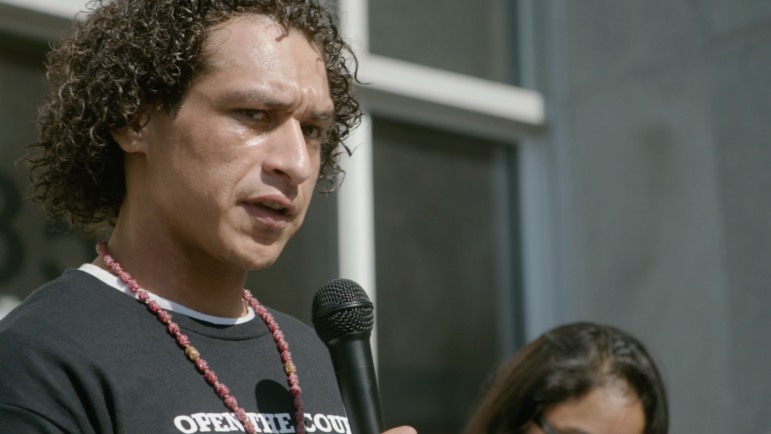
Sylvie Sturm / San Francisco Public Press
Robert Brewer, 31, tells a crowd at a 2022 protest what it was like to sit in jail for 288 days awaiting trial before being found not guilty.In a rally last September, defendants like Robert Brewer, 31, talked about the profound impact trial delays had on their lives. Brewer said he used to be a social butterfly, but since being release from a 288-day incarceration awaiting trial in San Francisco County Jail, he’s a changed man.
“There’s just a black cloud hanging over me,” Brewer said. “You’re treated like you’re guilty until you’re proven innocent. I lost my brother — my best friend. I wasn’t able to walk him out of this world.”
Right to a speedy trial
Receiving a speedy trial is a fundamental right guaranteed by both the Sixth Amendment to the United States Constitution and the California Constitution. According to federal and state law, if a defendant isn’t brought to trial within 60 days of arraignment for a felony or 30 days of arraignment for a misdemeanor, the case would be dismissed.
Long case delays can lead to undue anxiety for defendants, oppressive pretrial incarceration, faded memories among witnesses and the potential for lost evidence.
Certain time limit concessions are allowed, however. To keep a defendant in jail past mandatory limits, four legal requirements must be met: 1) there is enough evidence for a guilty verdict; 2) the defendant would harm others if released; 3) less restrictive measures are not an option; 4) and the judge must explain the decision for the record.
There are legal exceptions called “good cause,” which could include a defendant’s request to extend the trial, a defendant failing to appear for a hearing, a defendant having no legal representation at trial, the defendant becoming incapacitated and unable to defend themselves, or the case being too complex to process within time limits, for example in the case of multiple defendants.
The law allows for discretion over statutory time limits under “exceptional circumstances,” including matters of public health. In March 2020, COVID-19 shelter-in-place orders led Chief Justice Tani Cantil-Sakauye, chairperson of the Judicial Council of California, to shut down courts and extend the time limits on jury trials by 90 days.
The San Francisco Superior Court reopened all courtrooms on June 18, 2021. The Chief Justice’s orders were rescinded on June 30, 2022.
In December 2021, San Francisco Supervisor Hillary Ronen called a hearing on the case pileup. Afterward, two civil courtrooms were opened for out-of-custody criminal trials. But the backlog only increased.
The lawsuit filed by Raju in September 2021 states that pre-pandemic, the court would hold up to 150 misdemeanor trials annually, but since misdemeanor trials resumed in 2021, the court is averaging only 15 misdemeanor trials per year.
Earlier this year, the Public Defender’s Office filed Estrada v. Superior Court seeking to dismiss a criminal case for violating speedy trial rights. The lawsuit argued that the courts abused their discretion in claiming exceptional circumstances in violation of a defendant’s speedy trial rights. They argued that delays are not due to the pandemic, but rather to chronic court mismanagement, including unused courtrooms, excessive judicial vacations and failure to hold trials at the Civic Center courthouse.
In March 2023, the Court of Appeal supported the court. The appeals decision said the backlog resulted from court closures and later disruptions from COVID-19 case surges and new variants, and that the backlog could not reasonably be expected to dissipate within months or even a year or two, particularly given that new criminal cases keep being filed.
The San Francisco Superior Court referred to this decision in its filing with the State Supreme Court to argue that “a criminal defendant’s speedy-trial rights do not impose mandatory duties on courts to allocate resources, open courtrooms, hire staff, or upgrade security.”
Some civil rights groups have requested that the Estrada v. Superior Court decision be unpublished to avoid setting a dangerous precedent undermining the right to a speedy trial. In a written appeal, an organization based in Washington, D.C. called the Civil Rights Corps argued that weakening the right to a speedy trial makes “the plea bargain system impermissibly coercive, increasing prosecutors’ leverage in plea negotiations against people, both jailed and free, who await trial indefinitely. Deprived of their lone bargaining chip, the right to reject the offer and demand a speedy trial, the accused will end up begging rather than negotiating.”
The backlog
It is unclear how many criminal cases were left unresolved in San Francisco Superior Court last year. The court provided data for the California Judicial Council’s 2023 court statistics report stating that 35,265 criminal cases were filed — 3,086 felonies, 2,179 misdemeanors, and the rest mainly traffic-related infractions. It showed that civil filings totaled 12,004 cases with 10,433 resolved. But San Francisco was one of 10 counties that did not disclose the outcomes of criminal cases.
San Francisco also failed to provide its criminal case processing time. The 48 counties that did report their data showed that an average of 45% of felony cases and 43% of misdemeanors cases were resolved in less than 90 days.
Several Bay Area counties made accommodations to whittle down their trial backlog. Contra Costa County cut its trial backlog in half by March 2022. And other counties used alternative venues for pretrial proceedings like jury assembly, including the San Mateo County Event Center and the Sonoma County Event Center at the Fairgrounds. That freed up county courtrooms for trials. San Francisco has made no such effort.
Courts outside the Bay Area also found ways to deal with unwieldy backlogs. Riverside County contended with its roughly 2,800 backlogged cases by bringing civil judges onto criminal trials.
San Francisco has 57 judicial officers — judges and others with the power to facilitate, arbitrate, preside over and make decisions on cases — for a population of 815,201. That’s just under seven judicial officers per 100,000 residents compared with a statewide average of 11.4 per 100,000 residents. Yet additional judges have not been brought in to help alleviate the workload, according to the public defender’s office — for example, by temporarily bringing civil judges onto criminal trials as was done in Riverside County.
According to Raju, the judges’ explanations for the backlog have recently shifted.
“Judges in the building are no longer reading a canned script that blames COVID for delays. And felony trials are moving forward faster by all indications,” Raju said. “But I’m also here to say that this situation is by no means over, and our work is not done.”
Meanwhile, the judges who are presiding over cases are taking vacations, but the courts aren’t finding substitutes to handle some of the caseload while they’re away — and that’s taking a huge toll, according to an analysis by Deputy Public Defender Oliver Kroll.
Kroll filed a petition in Estrada v. Superior Court. His analysis of the court’s vacancies during the COVID-19 pandemic showed that between July 2021 and May 2022, courtrooms were empty 56% of the time. And from April to August 2022, 59% of the vacancies were due to judges’ vacations.
During a protest in front of the Civic Center courthouse on July 21, Deputy Public Defender Sujung Kim said people have a right to take vacations but, “the court has an obligation to find coverage for these judges when they’re on vacation.”
“A government agency like the court serves the people, that is their job, they’re public servants. And so, they have a duty to make sure that the courts are fully staffed and they’re not doing it,” Kim said.
In March 2022, the court gave an explanation for why trials were being delayed in response to Hernandez-Valenzuela v. Superior Court, which sought a dismissal for a criminal case for violating speedy trial rights.
The court stated that delays were happening because the San Francisco Sheriff’s Office was overextended at the jails and the Hall of Justice, that security at the Civic Center courthouse was inadequate for criminal trials other than nonviolent misdemeanors, and there were not enough bailiffs to cover each courtroom.
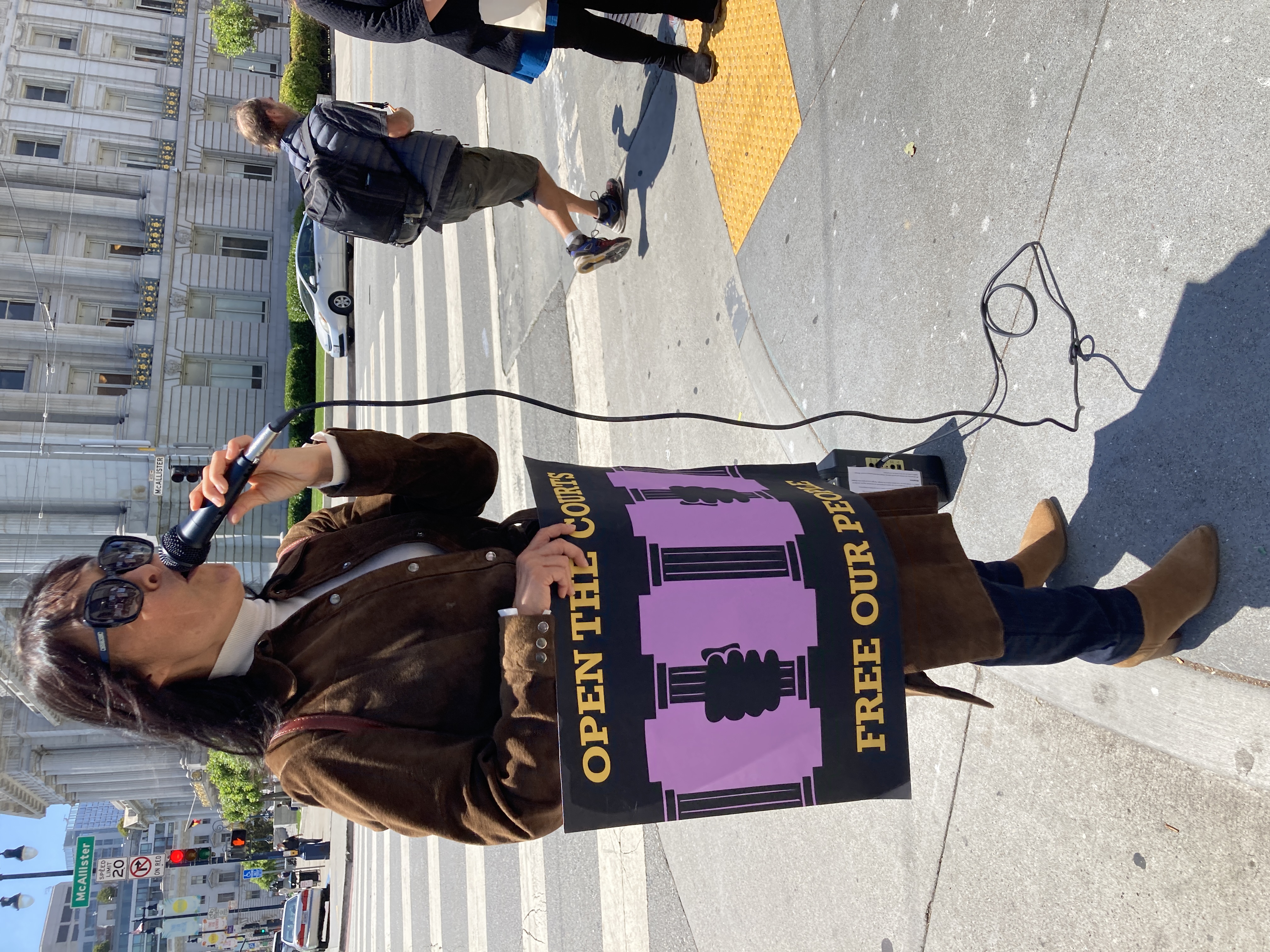
Sylvie Sturm / San Francisco Public Press
Sujung Kim, a San Francisco deputy public defender, says San Francisco Superior Court should find substitutes when judges go on vacation. “They have a duty to make sure that the courts are fully staffed and they’re not doing it,” she said.In an emailed response, the Sheriff’s Office stated that the court is using two courtrooms at the Civic Center courthouse and “is going to be using” the Criminal Justice Center for out-of-custody felony trials.
“These two locations lack some of the security features that make the Hall of Justice a safer place for those trials,” the email stated. “The Sheriff’s Office, as always, is collaborating with the Court to address security concerns related to the change of use of the Criminal Justice Center and the increased number of criminal cases being assigned in the Civic Center Court.”
Kim said she is dubious that security concerns were the main issue because the Civic Center Courthouse was used for felony trials for many years.
“When they ran out of space at the Hall of Justice, there were too many cases, they had to open up some of these courtrooms,” Kim said in an interview. “They tried murder cases, sexual, all kinds of cases. But now, the courts excuse for why they can’t try criminal cases here at this courthouse is because of, quote unquote, security reasons. We have probed and asked, and they have never given us any more details about what exactly the security concerns are. We’re very skeptical that that is the true reason.”
Kroll said in an interview that justice is being denied because the absence of trial deadlines without clear reasons gives the district attorney’s office no motivation to settle a case. And a defendant’s desperation may compel them to agree to a prosecutor’s terms regardless of guilt or innocence.
“Coercive plea bargaining is the leading cause of wrongful conviction,” Kroll said. “And then the conviction haunts you for the rest of your life, like a scarlet letter.”
During a protest in front of the Civic Center courthouse, Deputy Public Defender Zach Waterman from the Misdemeanor Unit explained why defendants in misdemeanor cases are especially vulnerable to wrongful convictions.
“Evidence in misdemeanors — there’s none of that. Not until you get to a trial,” Waterman said. “In a felony, you have a preliminary hearing, they have to put officers on the stand, they’ll tell you what happened, and you get to cross examine them. In a misdemeanor, there is no hearing. You’re presumed guilty. That’s what this court does every single day, in every single case, until you fight all the way to the moment of your trial.”
The harm
Kroll’s petition in Estrada v. Superior Court includes several declarations by defendants who described their ordeal:
“Alexandra Andrews, who is detained pretrial in County Jail 2 in San Francisco, writes that she was subjected to weeks-long lockdowns where she was not allowed out of her cell at all. She has not been able to contact her family because she was not given a working phone pin number. She writes: ‘It feels like my mental stability is continuing to degrade . . . I feel like I’m dealing with everything on my own.’”
Another declaration states:
“Felipe Preciado, who is detained pretrial in County Jail 3 in San Bruno, writes that he is often confined in a small, dirty, poorly ventilated cell with another inmate for the entire day, without even time out of the cell to shower. He writes: ‘Being here has completely changed me . . . I’m filled with despair.’”
Despite the conditions in county jail, the stress of looming trials can lead defendants to choose jail hoping for a faster resolution that would free them from strict restrictions, according to the public defender’s office.
Charles Underwood, who is unhoused and legally blind, was charged with misdemeanor assault and battery and requested pretrial jail hoping to expedite his case. Nevertheless, his case was delayed four months. In June, a jury acquitted him after two hours of deliberation.
Brewer, who spent 288 in jail before his trial, was also found not guilty by a San Francisco Superior Court jury. He had been charged with murder for the Aug. 19, 2020 shooting in the Tenderloin of 44-year-old Contra Costa County resident Darrelle Scales. Brewer said he shot Scales in self-defense after approaching Scales’ car, believing it to be his own rental car. A dispute ensued and Brewer walked away, but Scales followed while reaching for a shiny object in his waistband. Brewer retaliated by shooting. The object turned out to be a metal pipe.
Sarina Borg, 45, was also acquitted after more than two years in jail. During the September 2022 public defender rally, her mother, Myra Borg, talked about the impact of her daughter’s years-long incarceration without a conviction.
“As a result of the horrible conditions in jail and being misdiagnosed for nearly two years, my daughter is now ill with a very serious condition that has resulted in her lungs collapsing and is spreading to other organs in her body,” Borg said. “Her doctors at San Francisco General prescribed medicine and treatment, but when she returns to jail, it takes weeks for her to receive her prescribed medication and treatment.
“I keep praying that this nightmare will end, and my daughter will come home to me and her children so we can begin to heal together.”
It would take yet another 2 months for her daughter to be released. In May 2020, Sarina Borg was accused of aiding and abetting a February 2020 homicide. Her case finally went to trial in October 2022, and in early November, a judge decided there wasn’t enough evidence to show that Borg knew about the alleged murderer’s intentions. The judge granted a motion for acquittal before the case could go to the jury.
The situation in San Francisco County jails is only expected to get worse as city, county and state law enforcement agencies increase the rate of arrests following their May announcement of a new measure to crack down on drug dealers and unhoused people appearing intoxicated on city streets. By July 23, those agencies had logged 502 arrests collectively for drug sales in San Francisco, compared with 566 such arrests in all of 2022.
That’s what brought Dara Dadachanji, a software engineer who lives in the Tenderloin, to the July 21 public defender’s protest at the Civic Center courthouse. He said he’s rattled by what he views as unfair treatment of people experiencing homelessness in his neighborhood.
“People are just waiting in jail for loitering and doing a lot of things where, like, 90% of these cases are gonna get dismissed,” Dadachanji said. “The situation is really bad and a lot of the reason it’s bad is because we sweep people from other areas of the city into the Tenderloin and they’re treating it as a containment zone. But we need to house these people, we need to give them housing, shelter, food and access to resources to get back on their feet. We can’t just arrest them and hope that that’s going to make things go away.”
Both the police crackdown and the trial backlog are taking a disproportionately hard toll on the city’s minority communities. The Sheriff’s Office told the San Francisco Chronicle that of the 58 people arrested for breaking public intoxication or drug possession laws in the first week of the program, 25 were Latinos, 23 white, nine Black and one American Indian. And while about 5.6% of San Francisco residents are Black, more than half the people in San Francisco’s jails whose speedy trial deadlines have passed are Black, according to Raju.
Deputy Public Defender Jacque Wilson said during last Friday’s rally that he felt the injustice personally because he had two brothers who were in prison during the pandemic.
“There’s nothing like trying to hug on a loved one from a jail cell,” Wilson said. “Somewhere, I read that the greatness of America was about the right to a speedy jury trial. Somewhere I read about the greatness of America was the right to go to trial, and the presumption of innocence. All of that is being ignored here in San Francisco.”
Story update
On Aug. 7, Raju and his co-plaintiffs filed a response to the Superior Court’s petition for review.
The Superior Court had stated in its petition that if taxpayers could bring actions against state officials, that would “allow lawsuits that any of millions of taxpayers may initiate with a single, unverified complaint to burden courts and judges with collateral litigation about litigation, thus causing delay and wasting resources.”
Raju’s written response refuted this prediction.
“Their fears are groundless,” states the filing. “Taxpayer actions are a limited tool to address the rare situations — like this one — in which an unlawful court policy violates a mandatory duty that the law already imposes on courts.”
Raju’s filing called the prospect of millions of taxpayers overwhelming trial courts “fanciful” since the California Supreme Court has sanctioned multiple taxpayer lawsuits against state officials over many decades.
“The floodgates have been open for more than forty years. But there has been no flood of taxpayer litigation,” states the filing. “That is likely because most courts are careful to comply with their legal obligations, most taxpayers have no interest in launching costly and time-consuming lawsuits against government bodies, and the unavailability of money damages eliminates the main incentive for nuisance suits.”
San Francisco Superior Court had conceded that it was subject to taxpayer actions during arguments before the Court of Appeal, which ruled that this argument was “frankly specious.”
Nevertheless, the Superior Court argued in its petition for review that the matter is not settled law, and that a case making its way through the courts will determine whether California recognizes taxpayer standing to bring actions against state officials with a ruling that could eliminate or significantly change the basis for this lawsuit.
Correction: An earlier version of this article stated that Deputy Public Defender Jacque Wilson had two brothers in San Francisco County Jail. In fact, they were in prison during the coronavirus pandemic. An earlier version of this story reported that a public defender rally occurred in September 2021. It occurred in September 2022.
